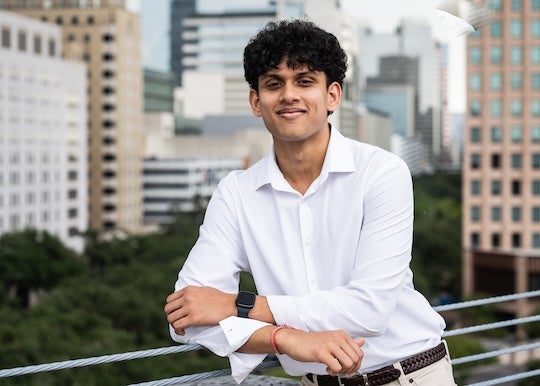Bibek Samal, a senior at Rice University, has been selected to present his research on subarachnoid hemorrhage (SAH) and platelet aggregation at the Congress of Neurological Surgeons (CNS), taking place Sept. 28-Oct. 2 at the George R. Brown Convention Center in Houston. The CNS is a leading international forum for neurosurgical professionals, boasting over 10,000 members worldwide.

“It’s not every day you get to speak to a whole room of people in your field who are at a higher level,” said Samal, who is a neuroscience major. “I’m not too nervous — I’m more excited.”
Samal’s research focuses on understanding how platelets, which normally aid in blood clotting, can exacerbate neurological damage in patients suffering from SAH. His work is conducted in collaboration with McGovern Medical School at UTHealth Houston. Under the guidance of Devin McBride, an assistant professor in the Vivian L. Smith Department of Neurosurgery at UTHealth and a Rice undergraduate research mentor, Samal’s work is gaining attention in the neurosurgical community.
“Being selected for an oral presentation at CNS is an honor,” McBride said.
SAH occurs when blood from a ruptured vessel leaks into the space surrounding the brain, causing severe neurological damage. Current treatment options for this condition are limited, and Samal’s research seeks to address this gap by targeting platelet aggregation, a critical factor in the body’s clotting mechanism. His research suggests that preventing platelet activation in these cases could reduce tissue damage and improve patient outcomes.
Samal expressed his excitement for the opportunity to present his findings at the conference, where leaders in the neurological field will gather.
“The chance to share my work with some of the brightest minds in neurosurgery is exciting,” Samal said. “I hope that by explaining what we’ve discovered, we can spark new ideas on how to take our research from the lab and turn them into a surgical solution in the future.”
His research holds potential for future clinical trials, a goal Samal is eager to pursue. “My entire work is focused on the role of platelets within subarachnoid hemorrhaging and how we might be able to decrease platelet aggregation or activation to potentially discover a new type of treatment,” he said.
Samal credits Rice with shaping his academic and professional path through its outstanding academic programs and collaborations with the Texas Medical Center (TMC).
“Rice helped me become the person I am today,” Samal said. “The university’s strong premed and neuroscience programs and proximity to the TMC have given me access to opportunities I wouldn’t have had elsewhere. I’m grateful for that.”

